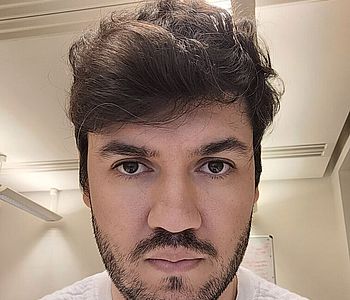Jefferson Viel | Associate Postgraduate

Home Institution
:
Universität São Paulo
|
Position
:
Ph.D. candidate
|
Disciplines
:
Philosophy
|
Biography
Jefferson Viel is a doctoral student in philosophy at the University of São Paulo (USP), Brazil, and a doctoral fellow at the March Bloch Center in Berlin. His research focuses on the relationship between emancipation and consciousness in Marxist thought. Previously, he held the position of lecturer at the State University of Northern Paraná (UENP), Brazil (2020 to 2022), and that of visiting professor at the Federal University of Uberlândia (UFU), Brazil (2021 to 2023). He has also translated into Portuguese works by authors associated with Italian operaism and French post-structuralism. He currently serves as the editor of the collection of translations of Gilles Deleuze's lectures at Vincennes/Saint-Denis, published by Editora Filosófica Politeia, São Paulo.
Scholarship
National Council for Scientific and Technological Development (CNPq), Brazil.
Researchtopic
Marxism, emancipation, organisation of social movements, consciousness, common.
Title of thesis
The concept of common and the new struggles against capitalInstitution of thesis
Supervisor
Projects
This research is an examination of the concept of common, based on developments noted in the joint works of Michael Hardt and Antonio Negri. Its objective is to address the question of whether this concept can contribute to resolving the challenges that Marxist political thought has faced in the past century, particularly those concerning the sphere of organization, such as the trade-offs between unity and multiplicity, and between verticality and horizontality in movements of social critique and creation.
In order to gain a comprehensive understanding of the theoretical underpinnings of these dilemmas, we propose to organize the research process into three distinct phases:
The initial phase of the research involves an examination of the concept of the proletariat as it is presented in the early works of Karl Marx and Friedrich Engels. Although in these writings the notion of the proletariat is rarely separated from a so-called "real" socio-political subject, the objective is to underscore the genuinely philosophical character of the concept and its integration into the broader issue of emancipation, as addressed by the principal figures of what is known as "Classical German Philosophy." In this regard, the interconnections between the concepts of proletariat and consciousness are elucidated.
The second phase of the research will examine the ways in which these concepts are developed in the philosophy of the young György Lukács, with particular focus on his work History and Class Consciousness. In this context, the interconnection between the notions of totality and revolution is emphasized, as the author posits that totality serves as the fundamental principle of revolution within the domain of thought. From this perspective, the concept of class consciousness, derived from Marxengelsian discussions of proletarian consciousness, also assumes primary importance.
The third phase of the research will considers the responses to the proposition that the proletariat constitutes a "universal class" and, indeed, the most favoured political agent in the struggle for liberation. These reactions can be situated within the framework of so-called "micro-political" theories, of which Gilles Deleuze and Félix Guattari are two of the most prominent exponents. The Deleuzian critique of dialectics and Guattari's concepts of transversality and molecular revolution are presented here, along with the authors' shared reflections on war machines. This can be seen as an important attempt to understand the new movements of critique and social creation that emerged around 1968, as well as an alternative to the Marxist approach to the problem of emancipation.
Upon completion of the aforementioned three stages, the research should be able to focus its attention on the contributions of Hardt and Negri. As previously indicated, these contributions endeavor to address some issues in 20th-century organizational thought, such as the apparent dichotomy between an unified proletariat and the fragmentation of disparate political actors engaged in discrete struggles. In this sense, the research endeavors to elucidate the manner in which the disparate movements observed in recent decades can be assembled to form a unified, liberative struggle on a macro scale.
Paradoxes of Emancipation
Publications
(2022) Da fábrica à metrópole, e além. 17 p. São Paulo (SP): Sobinfluencia
(2020) Uma leitura operarista da história. In Cadernos de Ética e Filosofia Política da Universidade de São Paulo, v.2, p. 205-220
(2019) Deleuze e Guattari: uma filosofia para o século XXI (ed.) 192 p. São Paulo: Politeia
(2017) Foreword to 'As verdades nômades: por novos espaços de liberdade', by Félix Guattari and Antonio Negri (with Mario Marino). 14 p. São Paulo (SP): Politeia.